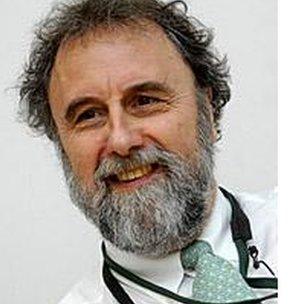Science adviser warns climate target 'out the window'
- Published

Prof Sir Bob Watson: Leadership needed
One of the government's most senior scientific advisers has said that efforts to stop a sharp rise in global temperatures were now "unrealistic".
Prof Sir Bob Watson said that any hope of restricting the average temperature rise to 2C was "out the window".
He said that the rise could be as high as 5C - with dire consequences.
Sir Bob added the Chancellor, George Osborne, should back efforts to cut the UK's CO2 emissions.
He said: "I have to look back on [the outcome of successive climate change summits] Copenhagen, Cancun and Durban and say that I can't be overly optimistic.
"To be quite candid the idea of a 2C target is largely out of the window."
Sir Bob is among the most respected scientists in the world on climate change policy.
He is currently chief scientist at the Department for Food and Rural Affairs and a former chair of the Intergovernmental Panel on Climate Change.
He also used to work for the World Bank and was a senior adviser to former Vice-President Al Gore at the White House.
Sir Bob, who steps down from his role at Defra next month, suggested that the Chancellor, George Osborne, reconsidered his opposition to tough measures to reduce carbon dioxide emissions.
Mr Osborne has said that the UK's ambitious targets for CO2 should be relaxed so as not to drive businesses to countries which have set themselves much lower targets.
"I would say to George Osborne: 'Work with the public sector. Work with the public on behaviour change. Let's demonstrate to the rest of the world that we can make significant progress here'."
Sir Bob argues that the UK and Germany should continue to take the lead in driving efforts to reach an effective international treaty.
Hurt poorest
"If we carry on the way we are there is a 50-50 chance that we will get to a three-degree rise," he said.
"I wouldn't rule out a five-degree world and that would be quite serious for the people of the world, especially the poorest. We need more political will than we currently have."
It suggests that the impact on human health, the availability of food and water, the loss of coastlines becomes progressively worse as the average temperature of the planet rises.
The 2C target was agreed at the United Nations Framework Convention on Climate Change meeting in 2010.
The majority of countries, though, prefer a lower target of 1.5C.
A number of analyses have also concluded that the 2C target would be missed. The most recent was by the International Energy Agency earlier this year.
Sir Bob added that deep cuts in CO2 emissions were possible using innovative technologies, without harming economic recovery.
"This doesn't take a revolution in energy technology - an evolution would get us there.
"So the question is, is there the political will - and everyone (ends up) looking at each other."
Follow Pallab on Twitter, external
- Published23 July 2012
- Published9 August 2012
- Published25 April 2012
- Published25 July 2012